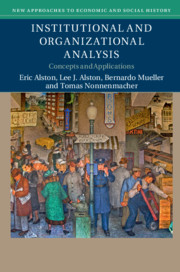Crossref Citations
This Book has been
cited by the following publications. This list is generated based on data provided by Crossref.
Alston, Lee J.
2017.
Beyond Institutions: Beliefs and Leadership.
The Journal of Economic History,
Vol. 77,
Issue. 2,
p.
353.
Libecap, Gary D.
2018.
Handbook of Cliometrics.
p.
1.
Garoupa, Nuno
and
Spruk, Rok
2018.
Lone Wolves, Sleeping Elephants or Predator Hawks? Institutional Shocks and Counterfactual Long-Run Development Paths.
SSRN Electronic Journal ,
Bodon, Herminio
Bustamante, Pedro
Gomez, Marcela
Krishnamurthy, Prashabnt
Madison, Michael J.
Murtazashvili, Ilia
Murtazashvili, Jennifer Brick
Mylovanov, Tymofiy
and
Weiss, Martin B. H.
2019.
Ostrom Amongst the Machines: Blockchain as a Knowledge Commons.
SSRN Electronic Journal ,
Libecap, Gary D.
2019.
Handbook of Cliometrics.
p.
811.
Gray, Thomas R
2019.
Executive Influence on State Supreme Court Justices: Strategic Deference in Reappointment States.
The Journal of Law, Economics, and Organization,
Vol. 35,
Issue. 2,
p.
422.
2019.
Bibliography.
International Review of Social History,
Vol. 64,
Issue. 2,
p.
345.
Lueck, Dean
2019.
Yoram Barzel and the Economics of Institutions.
Man and the Economy,
Vol. 5,
Issue. 2,
Alston, Eric
Law, Wilson
Murtazashvili, Ilia
and
Weiss, Martin B. H.
2020.
Can Permissionless Blockchains Avoid Governance and the Law?.
SSRN Electronic Journal ,
Harris, Colin
Cai, Meina
Murtazashvili, Ilia
and
Murtazashvili, Jennifer
2020.
The Origins and Consequences of Property Rights.
Manning, Patrick
2020.
A History of Humanity.
Si, Steven
Ahlstrom, David
Wei, Jiang
and
Cullen, John
2020.
Business, Entrepreneurship and Innovation Toward Poverty Reduction.
Entrepreneurship & Regional Development,
Vol. 32,
Issue. 1-2,
p.
1.
Alston, Eric
2021.
Norms, Institutions and Digital Veils of Ignorance – Do Network Protocols Need Trust Anyway?.
SSRN Electronic Journal ,
Seligson, Daniel
and
McCants, Anne E. C.
2021.
Coevolving institutions and the paradox of informal constraints.
Journal of Institutional Economics,
Vol. 17,
Issue. 3,
p.
359.
Alston, Eric
Crepelle, Adam
Law, Wilson
and
Murtazashvili, Ilia
2021.
The chronic uncertainty of American Indian property rights.
Journal of Institutional Economics,
Vol. 17,
Issue. 3,
p.
473.
Cai, Meina
Caskey, Greg
Cowen, Nick
Murtazashvili, Ilia
Murtazashvili, Jennifer Brick
and
Salahodjaev, Raufhon
2021.
Individualism, Economic Freedom, and Charitable Giving.
SSRN Electronic Journal,
Zhou, Yang
2021.
Ideology, Censorship, and Propaganda: Unifying Shared Mental Models.
SSRN Electronic Journal,
Alston, Eric
Law, Wilson
Murtazashvili, Ilia
and
Weiss, Martin B. H.
2021.
Blockchain Networks as Constitutional and Competitive Polycentric Orders.
SSRN Electronic Journal,
Anderson, Kristina R.
Knee, Eric
and
Mowatt, Rasul
2021.
Leisure and the “White-Savior Industrial Complex”.
Journal of Leisure Research,
Vol. 52,
Issue. 5,
p.
531.
Murtazashvili, Jennifer Brick
and
Murtazashvili, Ilia
2021.
Land, the State, and War.



